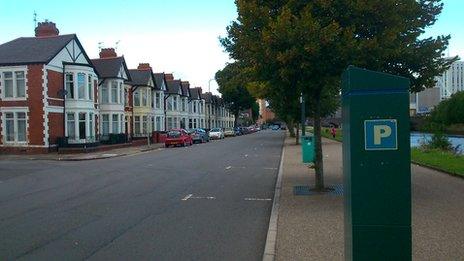Cardiff plans to tackle street prostitution
- Published
A study found that Cardiff has about 120 street sex workers
A 12-point plan to tackle street prostitution problems in Cardiff is due to be discussed by city officials.
The plan includes exploring whether sex workers can be moved away from homes in Grangetown and Splott into non-residential areas.
It follows an inquiry by the council which found about 120 women were involved in street prostitution.
The research claimed 95% of them came from abusive backgrounds and were often addicted to class A drugs like heroin.
Cardiff council's cabinet is meeting on Monday to make its response to the report published in March last year by the Community and Adult Services Scrutiny Committee of the council.
The report, external warned there was "no overarching strategy" for tackling sex work and prostitution in the Welsh capital, and what "piecemeal" responses were being undertaken were down to individual officers' commitment - rather than any strategic approach.
The issue of street prostitution in areas around Grangetown and Splott has been high on the agenda for the local communities for more than a decade - since the redevelopment of Cardiff's traditional red-light district pushed sex workers into residential areas.

Redevelopment of parts of Cardiff has seen sex workers move to the Grangetown and Splott areas
Before that areas around the city centre and parts of the docks were where the vast majority of prostitutes worked.
As part of the Cardiff cabinet discussion, officers have recommended that it accepts a move to: "Explore the pros and cons of diverting street sex work/prostitution into non-residential areas to reduce the impact on residential neighbourhoods."
The mood of some of the local residents in the areas affected was summed up by research carried out by Swansea University, in which 200 households were interviewed.
Reducing harm
"It should be stopped in residential areas. They leave condoms in our bin area also on street and in parks where children play," one resident told the study team.
"I've still got the log book where I used to write down what I saw," said Grangetown campaigner, Valerie Howard.
She has helped the issue become a regular policing priority through the area's local police and community group, Pact.
"I think that they're still in the area but I also think things are definitely better. They seem to have moved - but I'm not quite sure where," she said.
Other recommendations under consideration, external by council leaders are aimed at addressing the issues of health and safety of sex workers, and helping them get out of the sex trade.
They include:
Harm reduction and safeguarding of communities
Training of frontline staff and improving the health and wellbeing of street sex workers
Consider providing education to certain groups of secondary school age pupils on positive relationships
Consider whether further research identifying the routes into sex work/prostitution is required
But officers have recommended that a measure to regulate the off-street sex trade is rejected.
It would have seen the council extend its licensing policy to cover massage parlours and saunas in the city, to allow inspection visits with outreach workers.
It is estimated that nearly 400 people are involved working in off-street sex work in Cardiff.
But the council cabinet has been told that changes to the licensing regulations would need a change in UK legislation.
- Published21 September 2012
- Published9 September 2010
- Published2 December 2012